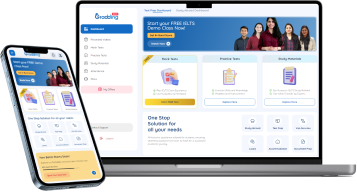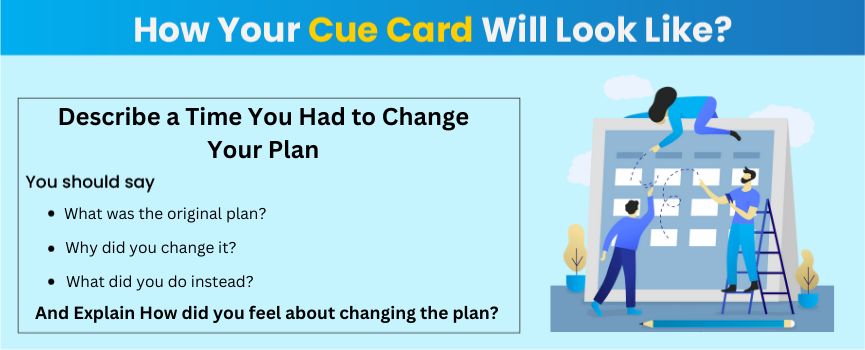Describe a Time You Had to Change Your Plan- IELTS Cue Card
Last updated: Aug 30, 2025If you are getting ready for the IELTS Speaking test, you might be looking for a way to tackle the topic of “Describe a Time You Had to Change Your Plan.” This is a great opportunity for you to show off your fluency and vocabulary while sharing a personal story. Whether it pops up in Part 2 or Part 3 of the IELTS speaking section, crafting a detailed and engaging response can really help you shine. In this blog, we will share some tips to make your answer structure even better, so you will feel super confident on test day!

Table of Contents
Introduction to IELTS Cue Cards
The IELTS cue cards, also known as the candidate task card, play a crucial role in Part 2 of the IELTS Speaking test. This section evaluates your ability to express your thoughts fluently and coherently on a given topic for 1-2 minutes. During the test, you will receive a cue card with prompts, and you will have 1 minute to organize your response. The examiner will assess your performance based on criteria such as fluency and coherence, lexical resources, grammatical range and accuracy, as well as pronunciation.
In this blog, we will focus on the topic “Describe a Time You Had to Change Your Plan,” which is a frequently encountered cue card question in the speaking part 2 section. We will discuss three model band 8+ sample answers, a list of used IELTS vocabulary, and practical tips to enhance your confidence and communication skills during the test, ultimately helping you improve your overall IELTS band score.

How to Answer the IELTS Cue Card
When responding to your cue card, it’s essential to adopt a structured and logical approach. Make sure to directly address the question and maintain a clear framework throughout your response. It is important to communicate your thoughts in a way that reflects organization and clarity. Your response will be evaluated based on four primary aspects: fluency and coherence, grammatical range and accuracy, and pronunciation. To achieve a commendable score in IELTS Speaking Part 2, it’s crucial to keep these key elements in mind.
Let’s explore the essential components to include when answering the cue card on “Describe a Time You Had to Change Your Plan.” Consider the following questions:
- What was the original plan?
- Why did you change it?
- What did you do instead?
- How did you feel about changing the plan?
Refer to the image below for an example of what your IELTS Speaking Part 2 cue card may resemble.

Describe a Time You Had to Change Your Plan - Sample 1
Here’s a sample response of “describe a time when you had to communicate a change in plans or direction to your peers/friends” that could help you get an 8+ band score in your cue card round.
What was the original plan?
The original plan was a three-day trekking trip to a national park, located approximately a six-hour drive away. Months of planning went into this trip, which included booking accommodation at a small guesthouse near the trails and purchasing hiking gear. A detailed itinerary was created, outlining the trails to be hiked each day. The group was excited about spending time outdoors and enjoying nature.
Why did you change it?
The plan had to be changed due to a sudden and severe weather forecast. A major, unseasonal rainstorm was expected over the entire weekend, bringing heavy rain and thunderstorms to the national park area. The park authority issued a warning that some trails might be closed due to the risk of flash floods. Given these dangerous conditions, especially in a hill station, it was clear that the trekking plan was no longer safe or feasible.
What did you do instead?
Instead of canceling the trip, an alternate plan was created. A nearby resort that offered indoor activities, a swimming pool, and a more relaxing atmosphere was chosen. A large cabin was booked at the last minute, shifting the focus from a physically demanding trip to a more leisurely experience. The new plan included playing board games, cooking meals together, relaxing by the pool, and enjoying conversations. While it was different from the outdoor adventure originally planned, the group was determined to make the most of it.
How did you feel about changing the plan?
Initially, there was disappointment and frustration. The hike had been highly anticipated, and it felt as though the careful planning had been in vain. However, once settled into the resort and engaging with the new activities, feelings began to change. The experience highlighted the importance of adaptability and flexibility. Being able to make a quick decision and find a new solution led to an equally memorable experience. This setback became a valuable lesson in embracing unexpected situations with a positive attitude.

 Access speaking Mock Test
Access speaking Mock Test Describe a Time You Had to Change Your Plan - Sample 2
Check out this second sample response of “Describe a Time You Had to Change Your Plan” designed to help you achieve that 8+ band score.
What was the original plan?
Last year, I was working at an international company and doing quite well, so I was offered a significant promotion to become a manager. I was thrilled with this fantastic news.
Why did you change it?
However, while preparing for the new position, I received another piece of good news: a scholarship from a prestigious university in America that covered all expenses, including tuition and accommodation a truly enviable package. I found myself in a dilemma, unsure whether to stay and advance my career or to go and further my education.
What did you do instead?
In search of guidance, I reached out to my friend Riya for her advice, as she had faced a similar choice before. She told me, "If you want to go far in this field, you need excellent qualifications, because without them, there's a limit to how high you can go. This promotion may seem appealing now, but it offers little room for growth." Taking her advice to heart, I decided to pursue my studies in America.
How did you feel about changing the plan?
Before I talked to Riya, I was completely overwhelmed by the situation. However, she helped me weigh the pros and cons of both opportunities and guided me in understanding which option would be more beneficial for my future. In the end, I was able to fulfill my dreams and make my parents proud.


Describe a Time You Had to Change Your Plan - Sample 3
Here’s a third sample that can guide you toward that 8+ band score as well!
What was the original plan?
A few days ago, I had to change my plan when an unexpected software glitch prevented our team from accessing critical client data for a campaign launch. The original plan was to use our new client management software to access an important database for a major campaign launch that was scheduled for the following day.
Why did you change it?
The new software experienced a significant and unexpected glitch, which prevented us from accessing any client data, including the information necessary for the campaign launch.
What did you do instead?
I immediately organized the team to switch to a manual process, using older physical files and backup spreadsheets to gather the necessary campaign data. While I managed the manual retrieval, other team members worked on troubleshooting and fixing the underlying software issue.
How did you feel about changing the plan?
Initially, I felt a mix of frustration and disappointment because the software malfunction threatened our deadline and disrupted our planned workflow. However, as we implemented the manual process and successfully launched the campaign, my feelings shifted to pride and satisfaction. It was a stressful experience, but it also underscored the importance of adaptability, strong teamwork, and the need for contingency planning.
These three examples are tailored for the cue card topic “Describe a Time You Had to Change Your Plan.” Next up, we’ll dive into some helpful vocabulary used in these samples.

Lexical Resources
The samples provided contain advanced vocabulary that can enhance your responses in the cue cards of the IELTS speaking section. This section presents a table of challenging words used in the previous samples along with their meanings, helping you to expand and refine your vocabulary as you prepare for the IELTS exam.
| Words | Meaning |
|---|---|
| Itinerary | A planned route or journey. |
| Trails | A mark or a series of signs or objects left behind by the passage of someone or something. |
| Alternate | Occur in turn repeatedly. |
| Leisurely | Acting or done at leisure; unhurried or relaxed. |
| Anticipated | Regard as probable; expect or predict. |
| Adaptability | The quality of being able to adjust to new conditions. |
| Embracing | Hold (someone) closely in one's arms, especially as a sign of affection. |
| Prestigious | Inspiring respect and admiration; having high status. |
| Enviable | Arousing or likely to arouse envy. |
| Dilemma | A situation in which a difficult choice has to be made between two or more alternatives, especially ones that are equally undesirable. |
| Appealing | Attractive or interesting. |
| Overwhelmed | Bury or drown beneath a huge mass of something, especially water. |
| Prevented | Keep (something) from happening. |
| Campaign | An organized course of action to achieve a goal. |
| Retrieval | The process of getting something back from somewhere. |
| Troubleshooting | Analyse and solve serious problems for a company or other organization. |
| Underlying | Significant as a cause or basis of something but not necessarily manifest or obvious. |
| Malfunction | A failure to function normally. |
| Disrupted | Interrupt (an event, activity, or process) by causing a disturbance or problem. |
| Implemented | Put (a decision, plan, agreement, etc.) into effect. |
| Underscored | Underline (something). |
| Contingency | A future event or circumstance that is possible but cannot be predicted with certainty. |
The vocabulary for IELTS introduced in the above-mentioned table will be beneficial for your cue card responses. The following section will also address potential follow-up questions that may arise in IELTS Speaking Part 3.
Master the IELTS exam with our Prep Boost
What’s included:
- Pre-recorded video lectures
- Advance Study Materials
- Detailed Feedback Report
Follow-up Questions
Once you finish your cue card round, it’s time for the IELTS Speaking Part 3. You can expect the examiner to ask you 4-5 follow-up questions related to your cue card topic, like “Describe a Time You Had to Change Your Plan.” It’s a great chance to provide detailed answers filled with examples and personal experiences. Here are some follow-up questions you might encounter after your IELTS Speaking Part 2, look below:
1. Do you think people should always stick to their original plans? Why or why not?
Answer: Not always. While adhering to a plan shows commitment and discipline, circumstances can sometimes be beyond our control. In such cases, being flexible is more practical and can save time and resources.
2. How do young people usually react when their plans don’t work out?
Answer: Young people often feel frustrated or disappointed when their plans fail, as they may lack experience in dealing with setbacks. However, some are able to adapt quickly, especially if they have faced challenges in school or at work.
3. How important is it to have a backup plan in life?
Answer: Having a backup plan is very important because life is unpredictable. A Plan B helps us stay prepared and reduces stress when unexpected situations arise. It also demonstrates good foresight and problem-solving skills.
4. In your opinion, is it better to plan things in detail or to go with the flow?
Answer: It depends on the situation. For important tasks like exams, work projects, or travel, detailed planning is essential. However, for social activities or leisure, going with the flow can be more enjoyable and less stressful.
5. How do unexpected changes in plans affect teamwork or group activities?
Answer: Unexpected changes can create challenges in teamwork, especially if the team is not well-coordinated. However, good communication and cooperation can turn these challenges into opportunities for stronger collaboration.
Tips to Excel in the IELTS Cue Card
The IELTS speaking section shares several strategies and insights to support your success in the cue card segment and help you aim for a band score of 8 or higher. Consider the following recommendations:
- Prioritise clarity over speed. Maintain a steady pace to facilitate clear thinking and minimise errors.
- Practice speaking on various topics for a set duration of two minutes to enhance your fluency.
- Avoid using overly complex synonyms, as this may detract from the natural quality of your responses. Simpler words often convey your message more effectively.
- Broaden your vocabulary to express your thoughts with greater precision.
- Work on your language skills by acquiring new words, phrases, and idioms across diverse subjects.
- Engage in regular discussions in English with friends, family, or a language partner, and consider participating in IELTS speaking mock tests to gauge your progress.
- Utilise appropriate stress and intonation to highlight key points in your responses.
Conclusion
In conclusion, while the Speaking section of IELTS may present challenges, the right strategies can pave the way for success. We have examined the cue card topic above, along with accompanying sample answers. Additionally, you will find valuable phrases and tips to excel in this speaking round. If you require further support or would like to improve your speaking skills, we invite you to explore our affordable, both offline and online IELTS classes. Furthermore, after completing the exam, feel free to utilize our IELTS band score calculator tool to make predictions about your scores.
0 comments

Practice Makes a Man Perfect!Take FREE ielts Mock Tests
Start FREE Mock TestPredict your IELTS Band

98% students got exact IELTS Band
What is your Target IELTS Band?
Get familiar with the Real IELTS Exam for Free!
Start Free Mock TestWe are available in :
BangaloreAhmedabadJaipurHyderabadKeralaPuneChandigarhMumbaiGurgaonChennaiKolkataTrivandrumNoidaKochiCalicutKottayamKollamThrissurIndoreUdaipurdisclaimer:logos and other registered trademarks of universities used on this platform are held by their respective owners. Gradding does not claim ownership or association on them, and their use is purely for informational and illustrative purposes.
















